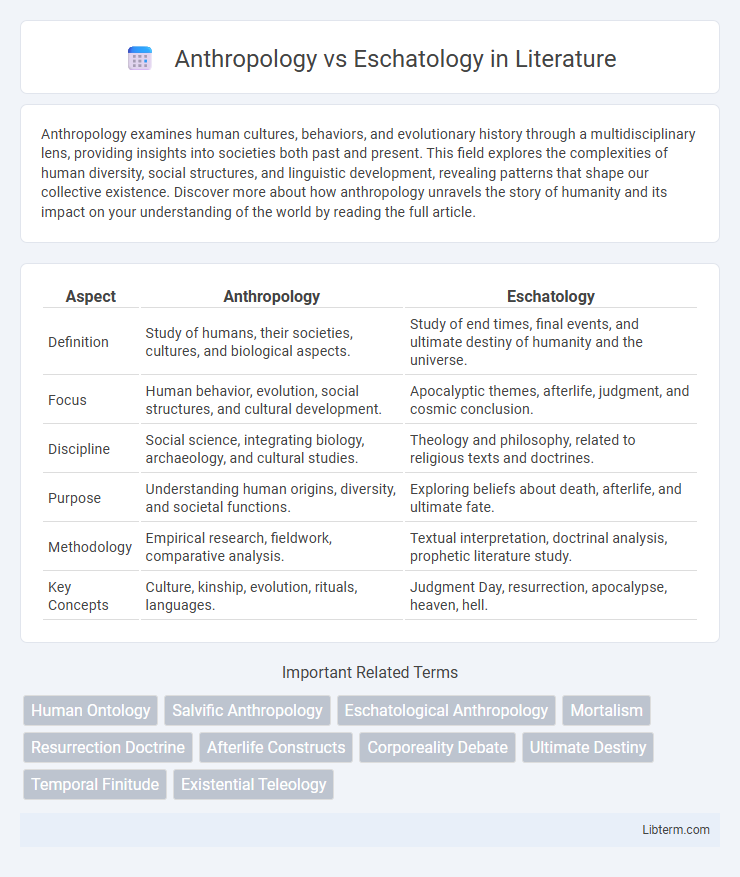Anthropology examines human cultures, behaviors, and evolutionary history through a multidisciplinary lens, providing insights into societies both past and present. This field explores the complexities of human diversity, social structures, and linguistic development, revealing patterns that shape our collective existence. Discover more about how anthropology unravels the story of humanity and its impact on your understanding of the world by reading the full article.
Table of Comparison
| Aspect | Anthropology | Eschatology |
|---|---|---|
| Definition | Study of humans, their societies, cultures, and biological aspects. | Study of end times, final events, and ultimate destiny of humanity and the universe. |
| Focus | Human behavior, evolution, social structures, and cultural development. | Apocalyptic themes, afterlife, judgment, and cosmic conclusion. |
| Discipline | Social science, integrating biology, archaeology, and cultural studies. | Theology and philosophy, related to religious texts and doctrines. |
| Purpose | Understanding human origins, diversity, and societal functions. | Exploring beliefs about death, afterlife, and ultimate fate. |
| Methodology | Empirical research, fieldwork, comparative analysis. | Textual interpretation, doctrinal analysis, prophetic literature study. |
| Key Concepts | Culture, kinship, evolution, rituals, languages. | Judgment Day, resurrection, apocalypse, heaven, hell. |
Defining Anthropology and Eschatology
Anthropology is the scientific study of humans, their behavior, cultures, and evolution, focusing on understanding what it means to be human across time and societies. Eschatology is a theological discipline concerned with the ultimate destiny of humanity and the world, exploring concepts such as death, judgment, and the afterlife in religious contexts. While anthropology analyzes human existence from a biological and cultural perspective, eschatology addresses the spiritual and existential questions about the end times and final outcomes of human history.
Historical Origins of Anthropology and Eschatology
Anthropology originated as a scientific discipline in the 19th century, evolving from earlier ethnographic and philosophical studies of human cultures and societies. Eschatology, rooted in religious and philosophical traditions, traces its historical origins to ancient theological explorations of end-times and ultimate destinies in cultures such as Mesopotamian, Hebrew, and Christian thought. Both fields emerged from humanity's quest to understand existence, with anthropology focusing on human life and cultures, while eschatology addresses the final events and purpose of the world.
Key Concepts in Anthropology
Anthropology studies human beings' origins, cultures, social structures, and biological evolution, emphasizing concepts like kinship, cultural norms, and adaptation. It explores how humans interact with their environment and develop diverse belief systems. In contrast, eschatology focuses on ultimate destiny and the final events of humanity, addressing themes of judgment, afterlife, and cosmic transformation.
Principal Themes in Eschatology
Eschatology primarily explores themes of final events, including death, judgment, and the ultimate destiny of the soul and humanity, contrasting with anthropology's focus on human origins and social development. Central to eschatology are concepts such as resurrection, the afterlife, and the final judgment, which reflect diverse religious interpretations of the end times. These themes are pivotal in understanding how cultures construct meaning about existence, morality, and the cosmos beyond human life.
Methodological Approaches: Anthropology vs Eschatology
Anthropology employs empirical fieldwork, participant observation, and ethnographic studies to understand human cultures and behaviors across time and space, emphasizing tangible, material evidence. Eschatology utilizes theological exegesis, scriptural analysis, and speculative reasoning to explore doctrines concerning the ultimate destiny of humanity and the cosmos, relying primarily on sacred texts and spiritual traditions. While anthropology prioritizes observable, data-driven methodologies, eschatology adopts interpretive frameworks rooted in faith and metaphysical beliefs.
Interdisciplinary Connections and Contrasts
Anthropology examines human cultures, behaviors, and biological evolution through empirical research methods, while eschatology explores theological and philosophical concepts concerning the end of the world or final destiny of humanity. Interdisciplinary connections emerge when anthropology analyzes eschatological beliefs across cultures, revealing how end-time narratives shape social structures and moral systems. Contrasts arise in methodology and epistemology, as anthropology relies on observable evidence and fieldwork, whereas eschatology often depends on religious texts and speculative reasoning.
Human Nature: Anthropological and Eschatological Perspectives
Anthropology examines human nature through biological, cultural, and social dimensions, emphasizing evolution, behavior, and societal structures. Eschatology explores human nature in relation to ultimate destiny, divine judgment, and the transformation or redemption of humanity in the end times. The intersection highlights contrasts between empirical human experience and theological interpretations of human purpose and fate.
The Role of Culture and Belief in Both Fields
Anthropology examines culture as a dynamic system shaping human behavior, social structures, and worldviews, emphasizing empirical study of rituals, myths, and symbols. Eschatology centers on beliefs about the ultimate destiny of humanity and the cosmos, interpreting cultural narratives that address death, afterlife, and final judgment. Both fields analyze how culture and belief influence human understanding of existence and inform practices, yet anthropology studies belief as a social phenomenon, while eschatology explores its theological implications.
Contemporary Issues: Relevance in Modern Discourse
Anthropology examines human behavior, culture, and societal development, providing critical insights into identity, migration, and ethical concerns in contemporary issues such as globalization and inequality. Eschatology explores beliefs about the end times, influencing modern discourse on environmental crises, technological advancements, and existential risks by framing human destiny and moral imperatives. The intersection of anthropology and eschatology shapes debates on future societal transformations, emphasizing the cultural impacts and ethical considerations of humanity's trajectory amid rapid change.
Future Directions in Anthropology and Eschatology
Future directions in anthropology increasingly incorporate eschatological perspectives to explore how cultures envision and interpret concepts of the future, death, and afterlife. Advances in ethnographic methods enable deeper analysis of belief systems, rituals, and narratives that shape societal understandings of what is to come. Integrating eschatology enhances anthropological studies by providing critical insights into human responses to existential uncertainty and temporal transformation.
Anthropology Infographic

 libterm.com
libterm.com